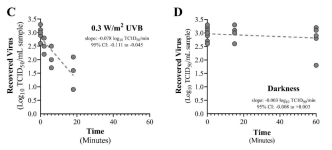Fjell said:
It implies that 80% of cases were asymptomatic and also that about 40% just didn?t get it at all despite probably trying quite hard to do so, including many cases where people shared a cabin for a long period. Very prolonged exposure (viral load?) is implied as an issue (ships doctor got very ill).
https://thorax.bmj.com/content/early/2020/05/27/thoraxjnl-2020-215091
I read the same results and see a slightly different set of important details:
a) at least some of the tests are crap
b) _at least_ 59% of the ship's population were able to catch the virus. Some may have recovered and now had undetectable levels of viral RNA. So much for herd immunity... as an (ex-)astrophysicist, 50% is basically the same as 100%.
c) a large number of people were asymptomatic _but_ this needs to be kept in context with antibody testing which shows the majority of people have not yet had the virus (only ~5% in the UK, 20% in London I think). I think this level of asymptomatic-ness is probably consistent with the large discrepancy in the number of people who have tested positive (~270,000) vs the expected number of cases from antibody studies (about 3.5 million from 70,000,000 * 5%). The Covid-19 app was predicting about 2 million _symptomatic_ people infected at the peak, which might seem a bit high if the asymptomatic rate is 80%, but it might be catching other stuff and/or 'asymptomatic' could mean different things to different people.
d) admittedly based on small-number statistics (one death), but a 0.8% death rate, and a 6.2% medical evacuation rate.
e) yet more small-number statistics, but interesting that if you get symptoms at all (only 12.5%), you have a high rate of needing medical care (6.3%) and about 50% of those requiring intubation and ventilation (3.1%).
Essentially tallies up with the 'mainstream' version of events (highly infectious, large number of asymptomatic cases, a relatively high death rate, little native immunity, high hospitalisation rate leading to significant impact on health services, about 50% of serious hospital cases requiring ventilation).
Your point about people trying and failing to get the disease is not necessarily valid; one of the cabin-mates could have had the virus, given it to their compatriot, recovered and now tested negative while the compatriot tests positive.




